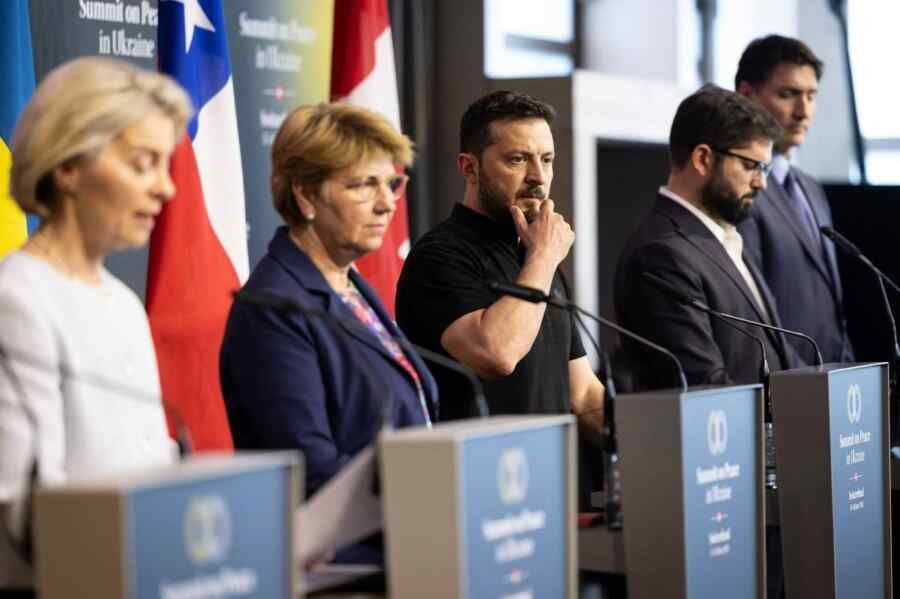A high-level conference held in Switzerland demonstrated the rejection of Zelenskyy’s “peace formula” by the countries of the collective West and Ukraine and the transition to tactical discussions on SMO-related issues, but definitely not aimed at a comprehensive settlement of the conflict
The final communiqué of the event contained only three paragraphs on nuclear and food security and the return of detainees. The conference did not even discuss the initially implausible points regarding the reintegration of the regions that were part of Ukraine in 1991, the withdrawal of Russian Armed Forces units from the territories of Crimea, DPR, LPR, Zaporizhzhia and Kherson regions, and placing all responsibility for the conflict on Russia. This situation was a logical continuation of the discussions on the settlement of the conflict in Ukraine without Moscow’s participation.
At the same time, it should be noted that the conference in Switzerland took place in the context of the parameters for the end of the crisis in Ukraine specified by Russian President Vladimir Putin. The main positions are as follows: a) cancellation of the Ukrainian law banning negotiations with Russia; b) withdrawal of Ukrainian troops from all territories of the DPR, LPR, Zaporizhzhya and Kherson regions; c) removal of the clause on the country’s integration into NATO from the Ukrainian constitution; d) fixing Ukraine’s nuclear-free status; e) demilitarisation and denazification of Ukraine in accordance with the clauses of the Treaty on Permanent Neutrality and Security Guarantees for Ukraine initialled by Moscow and Kiev in 2022; f) ensuring the rights, freedoms and interests of Russian-speaking citizens of Ukraine; g) lifting all Western sanctions against Russia.
After a comprehensive settlement of the conflict in Ukraine, the Russian president proposes to focus on creating an indivisible system of Eurasian security. It is important to say: the red thread of the Russian president’s speech was the axiom that it is impossible to end the hostilities without Russia’s full participation.
It is quite predictable that the Ukrainian side, as well as representatives of the collective West, categorically rejected the Russian president’s proposals.
Based on these circumstances, it is becoming increasingly obvious that at this stage of the conflict in Ukraine there are no universal proposals for its resolution and, as a consequence, opportunities for new initiatives are opening up. At the same time, it would be useful to recall the main proposals that have already been made by international mediators.
To date, the 12-point “China peace plan”, which covers all the main parameters of the conflict, remains the most comprehensive and compromise-oriented. In particular, it contains positions on the priority of international law without “double standards”, respect for the security interests of individual countries, refusal to expand military blocs, ceasefire, reduction of strategic risks, rejection of unilateral sanctions, launching peace talks, etc. The plan was later followed up by a joint memorandum of understanding with the international mediators. It was later followed up by a joint memorandum “Common Arrangements between China and Brazil on the Political Settlement of the Ukrainian Crisis”. This document proposes an international peace conference, recognised by Russia and Ukraine, where all peace proposals would be fairly discussed (a reference to the conference in Switzerland and previous events dedicated to the “Ukraine peace formula”, where discussions of any other initiatives were blocked).
It is also worth remembering the proposal of Brazilian President Luiz Inácio Lula da Silva to create an analogue of the G20 to promote conflict resolution and discuss the parameters of global security. Another important initiative was the Ramaphosa Plan, a proposal by a number of African countries aimed at a comprehensive settlement of the conflict.
In conclusion, it is important to note: the final communiqué of the conference in Switzerland states that various approaches and peace initiatives were discussed at the event. But here we can state that once again the collective West is blatantly lying. If Chinese, Brazilian and African initiatives had been discussed on equal terms at the conference, in addition to the “Ukrainian peace formula”, the final document would have turned out differently, and the Chinese delegation would have attended the event, and representatives of Brazil and South Africa would have signed the document. But most importantly, if the organisers had really set themselves the task of achieving a settlement of the conflict in Ukraine, no one would have questioned Russia’s presence and participation.
We can be sure that in the shortest possible time there will be several more systematic proposals to resolve the crisis, and if there is political will on all parties involved, a new opportunity to end the obviously protracted conflict will open up.
Denis Denisov, “Izvestia” newspaper

